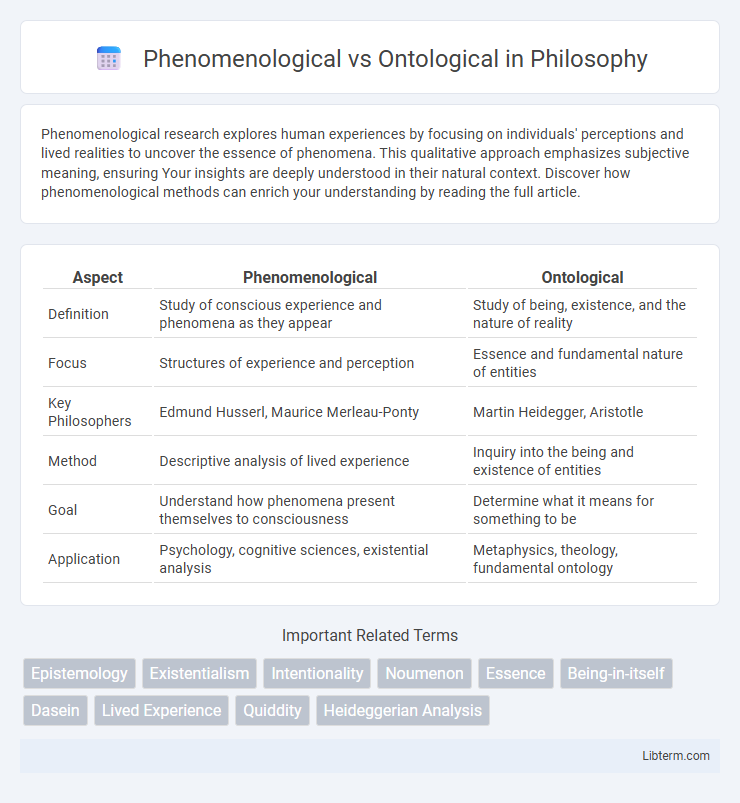Phenomenological research explores human experiences by focusing on individuals' perceptions and lived realities to uncover the essence of phenomena. This qualitative approach emphasizes subjective meaning, ensuring Your insights are deeply understood in their natural context. Discover how phenomenological methods can enrich your understanding by reading the full article.
Table of Comparison
| Aspect | Phenomenological | Ontological |
|---|---|---|
| Definition | Study of conscious experience and phenomena as they appear | Study of being, existence, and the nature of reality |
| Focus | Structures of experience and perception | Essence and fundamental nature of entities |
| Key Philosophers | Edmund Husserl, Maurice Merleau-Ponty | Martin Heidegger, Aristotle |
| Method | Descriptive analysis of lived experience | Inquiry into the being and existence of entities |
| Goal | Understand how phenomena present themselves to consciousness | Determine what it means for something to be |
| Application | Psychology, cognitive sciences, existential analysis | Metaphysics, theology, fundamental ontology |
Introduction to Phenomenological and Ontological Approaches
Phenomenological approaches prioritize the lived experience and consciousness of individuals, aiming to describe phenomena as they appear to human perception without preconceived theories. Ontological approaches focus on the nature of being and existence, seeking to understand the fundamental essence and reality underlying phenomena. Both methodologies provide critical frameworks for exploring human experience but differ in emphasis on subjective experience versus the nature of reality itself.
Defining Phenomenology: Key Concepts and Scope
Phenomenology centers on the systematic study of conscious experience, emphasizing intentionality, the directedness of consciousness toward objects, and the concept of "lived experience" as the primary source of knowledge. Key concepts include epoche, a methodological suspension of judgment to examine phenomena as they present themselves, and the notion of essence, referring to the fundamental structures of experiences that define their meaning. Its scope extends to exploring how individuals perceive, interpret, and make sense of the world, thereby uncovering the layers of meaning embedded within subjective experience.
Understanding Ontology: Fundamental Principles
Ontology explores the fundamental nature of being, existence, and reality, seeking to categorize entities and their relationships within a structured framework. This discipline delves into concepts such as substance, identity, time, and space, establishing a foundation for how we comprehend what entities exist and how they interact. Phenomenology contrasts by examining the structures of experience and consciousness from a first-person perspective, emphasizing how phenomena appear to individuals rather than defining objective categories of being.
Historical Development of Phenomenological Thought
Phenomenological thought emerged in the early 20th century as Edmund Husserl sought to establish a rigorous scientific foundation for philosophy by analyzing the structures of consciousness and experience. This tradition developed through key figures such as Martin Heidegger, who integrated ontological questions about Being into phenomenology, and Maurice Merleau-Ponty, who emphasized embodied perception. The historical evolution of phenomenology thus reflects a shift from pure descriptive methods toward a profound ontological inquiry, bridging subjective experience with the fundamental nature of reality.
Evolution of Ontological Philosophy
Ontological philosophy evolved from classical metaphysics, focusing on the fundamental nature of being and existence, whereas phenomenology centers on the structures of experience and consciousness. The ontological shift, influenced by thinkers like Heidegger and Sartre, emphasized 'Being' as a dynamic and temporal process, contrasting earlier static metaphysical conceptions. This evolution deepened the inquiry into the essence of reality beyond mere phenomena, shaping modern existential and metaphysical discourse.
Core Differences Between Phenomenology and Ontology
Phenomenology focuses on the study of structures of consciousness and the lived experience from the first-person perspective, emphasizing how phenomena appear to awareness. Ontology, as a branch of metaphysics, investigates the nature of being, existence, and reality itself, seeking to understand what entities exist and their fundamental categories. The core difference lies in phenomenology's descriptive analysis of experience, while ontology addresses questions about the constitution and categorization of existence independent of perception.
Methodological Implications in Research
Phenomenological research emphasizes understanding lived experiences through participants' subjective perceptions, guiding methodologies that prioritize qualitative data collection such as in-depth interviews and participant observation. Ontological approaches focus on the nature of being and reality, influencing research methods to explore existence and the fundamental structures of phenomena often through conceptual analysis and theoretical modeling. Combining phenomenological and ontological perspectives in research methodology encourages a comprehensive exploration that integrates experiential data with existential inquiry, enhancing depth and rigor in qualitative studies.
Applications in Philosophy, Psychology, and Social Sciences
Phenomenological approaches prioritize the study of conscious experience and subjective perception, making them essential in psychology for understanding individual cognition and emotions, as well as in social sciences for analyzing lived experiences and social phenomena. Ontological frameworks focus on the nature of being and existence, providing foundational concepts for philosophy in addressing questions about reality, and supporting psychological models that consider the essence of mental states beyond appearances. Integrating phenomenology and ontology enhances qualitative research methodologies, enabling deeper insights into human behavior, identity, and the structure of social reality.
Critiques and Limitations of Phenomenological and Ontological Approaches
Phenomenological approaches face critiques for their reliance on subjective experience, which may lead to challenges in achieving objective validation or generalizable knowledge across diverse contexts. Ontological approaches are often limited by their abstract and foundational nature, sometimes resulting in overly rigid frameworks that neglect empirical nuances and practical applicability. Both paradigms encounter difficulties in integrating with contemporary empirical methodologies, raising concerns about their relevance in interdisciplinary research settings.
Conclusion: Integrating Phenomenological and Ontological Perspectives
Integrating phenomenological and ontological perspectives enhances understanding by combining lived experience analysis with the study of being's fundamental nature. This synthesis allows for a more comprehensive grasp of human existence, capturing both subjective consciousness and objective reality. Embracing both approaches fosters deeper insights into how individuals perceive and engage with the world.
Phenomenological Infographic

 libterm.com
libterm.com